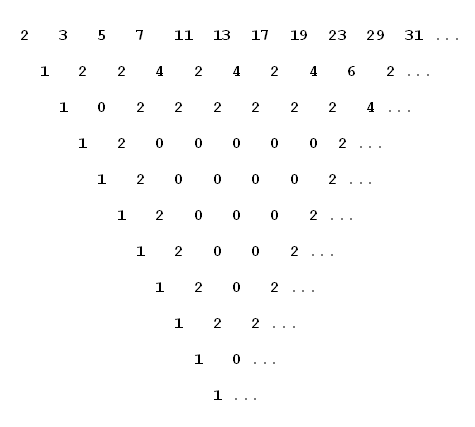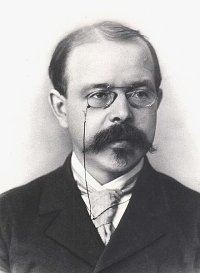- The telephone number 266-8687 spells both AMOUNTS and CONTOUR.
- 38856 = (38 – 85) × 6
- CARTHORSE is an anagram of ORCHESTRA.
- The French for paper clip is trombone.
- “The oldest books are only just out to those who have not read them.” — Samuel Butler
Science & Math
Gilbreath’s Conjecture
Doodling on a napkin in 1958, mathematician Norman L. Gilbreath noticed something odd. First he wrote down the first few prime numbers in a row. Then, on each succeeding row, he recorded the (unsigned) difference between each pair of numbers in the row above:

The first digit in each row (except the first) is 1. Will this always be true, no matter how many prime numbers we start with? It’s been borne out in computer searches extending to hundreds of billions of rows. But no one knows for sure.
Misc

- Tarzan’s yell is an aural palindrome.
- CONTAMINATED is an anagram of NO ADMITTANCE.
- The Swiss Family Robinson have no surname (“Robinson” refers to Robinson Crusoe).
- x2 – 2999x + 2248541 produces 80 primes from x = 1460 to 1539.
- “A great fortune is a great slavery.” — Seneca
Person to Person
Suppose that you enter a cubicle in which, when you press a button, a scanner records the states of all the cells in your brain and body, destroying both while doing so. This information is then transmitted at the speed of light to some other planet, where a replicator produces a perfect organic copy of you. Since the brain of your Replica is exactly like yours, it will seem to remember living your life up to the moment when you pressed the button, its character will be just like yours, and it will be in every other way psychologically continuous with you. Is it you?
— Derek Parfit, “Divided Minds and the Nature of Persons,” in Mindwaves, 1987
Math Notes

Cast of Thought

Suppose, therefore, a person to have enjoyed his sight for thirty years, and to have become perfectly acquainted with colours of all kinds, except one particular shade of blue, for instance, which it never has been his fortune to meet with. Let all the different shades of that colour, except that single one, be placed before him, descending gradually from the deepest to the lightest; it is plain, that he will perceive a blank, where that shade is wanting, and will be sensible, that there is a greater distance in that place between the contiguous colours than in any other. Now I ask, whether it be possible for him, from his own imagination, to supply this deficiency, and raise up to himself the idea of that particular shade, though it had never been conveyed to him by his senses?
— David Hume, An Enquiry Concerning Human Understanding, 1748
A Penny Saved

When German physicist Walther Nernst learned that his cowshed was warm because of the cows’ metabolic activity, he resolved to sell them and invest in carp.
A thinking man, he said, cultivates animals that are in thermodynamic equilibrium with their surroundings and does not waste his money in heating the universe.
“Plane Geometry”
‘Twas Euclid, and the theorem pi
Did plane and solid in the text,
All parallel were the radii,
And the ang-gulls convex’d.
“Beware the Wentworth-Smith, my son,
And the Loci that vacillate;
Beware the Axiom, and shun
The faithless Postulate.”
He took his Waterman in hand;
Long time the proper proof he sought;
Then rested he by the XYZ
And sat awhile in thought.
And as in inverse thought he sat
A brilliant proof, in lines of flame,
All neat and trim, it came to him,
Tangenting as it came.
“AB, CD,” reflected he–
The Waterman went snicker-snack–
He Q.E.D.-ed, and, proud indeed,
He trapezoided back.
“And hast thou proved the 29th?
Come to my arms, my radius boy!
O good for you! O one point two!”
He rhombused in his joy.
‘Twas Euclid, and the theorem pi
Did plane and solid in the text;
All parallel were the radii,
And the ang-gulls convex’d.
— Emma Rounds
Reservation Trouble
Socrates likes company. He wants to eat only if Plato wants to eat.
But Plato is angry at Socrates. He wants to eat only if Socrates does not want to eat.
Does Socrates want to eat?
(From Buridan’s Sophismata.)
À La Carte
Suppose there were an experience machine that would give you any experience you desired. Superduper neuropsychologists could stimulate your brain so that you would think and feel you were writing a great novel, or making a friend, or reading an interesting book. All the time you would be floating in a tank, with electrodes attached to your brain. Should you plug into this machine for life, preprogramming your life’s experiences? If you are worried about missing out on desirable experiences, we can suppose that business enterprises have researched thoroughly the lives of many others. You can pick and choose from their large library or smorgasbord of such experiences, selecting your life’s experiences for, say, the next two years. After two years have passed, you will have ten minutes or ten hours out of the tank, to select the experiences of your next two years. Of course, while in the tank you won’t know that you’re there; you’ll think it’s all actually happening. … Would you plug in?
— Robert Nozick, Anarchy, State, and Utopia, 1974
